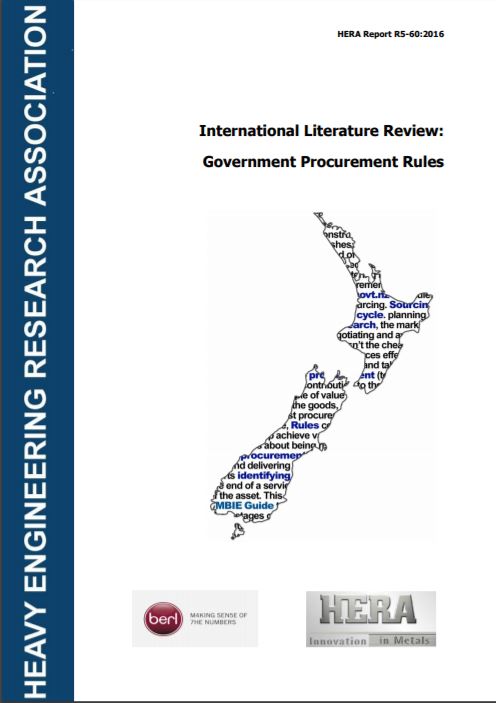It’s hard to ignore that the metal industries biggest clients and influencers are government and the public sector – if we want to successfully work with them, knowing the ins and outs of how they operate and think when it comes to procurement is a no brainer.
But is our model good? Does it compare to other countries? And, is there room for improvement? To get answers to these questions and be able to inform the stakeholders and influence policy setting, HERA commissioned BERL to perform an international literature review on the topic.
The BERL review focused on the three questions: how have other countries implemented the Government Procurement Rules as part of the World Trade Organisation Government Procurement Agreement (WTO GPA)? How do these approaches differ from New Zealand’s Government Procurement Rules? What aspects of these countries approaches could be implemented in New Zealand to strengthen our procurement rules?
The report covered the European Union with a specific look at the United Kingdom and Ireland, branching out to the USA Canada, Japan and South Korea. Australia is also discussed – although it hasn’t yet ratified the WTO GPA agreement.
Local vs. International
Review findings are that generally all WTO GPA countries follow the open competition rules of the GPA with an emphasis on transparency. But there are exceptions to the rules in the area of quality, exemptions and exclusions, such as:
- Entering in dialogue with suppliers around specification cost and prices
- Considering contribution to local events, charities and disasters
- Making exemptions from the WTO GPA eg. road works or defence procurement, and
- Excluding some states from the GPA (USA).
Interestingly our close neighbour and CER partner Australia are different and are governed by the Local Government Act 1989, a model similar to the open competitive ones in the EU, USA and Canada, but with one key change – where possible, they give preference to supplier firms from Australia and New Zealand versus “be fair to all suppliers” in the WTO GPA.
The best deal for everyone
Like most compared countries, New Zealand has an agreement to consider whole-of-life costing rather than just lowest cost and the evaluation of social and environmental impacts – with one very specific mandatory addition: the “Five Principles of Government Procurement”.
These principles in general support best practice in procurement and are focused on encouraging “get the best deal for everyone” including social, environmental and economic effects of the procurement decision, or balanced decision making – an emphasis not as obvious in procurement guidelines of other governments examined. We also note that the NZ rules do not provide direction or guidance on how to perform balanced decision making
Providing opportunities for small and medium enterprises
Most countries have specific provision to ensure large contracts are split into smaller subcontracts to enable participation of SME’s in the tendering process. This is also the case in New Zealand, however the review notes an anomaly in ‘Rule 22 on Subcontracting‘ – something not found in compared countries.
This rule states “once a supplier has been awarded a contract, any subsequent subcontracting the supplier does is not subject to the Rules”. The reviewers argue this shouldn’t be the case and conditions for subcontracting (particularly in larger subcontracts that could include local and international suppliers) should be consistent with good procurement practice.
What’s our take on it all?
Together with our industry partners Metals NZ and SCNZ, HERA has engaged with Government and its stakeholders in the Government’s procurement reform process and we truly believe New Zealand has a great set of rules in place to allow appropriate consideration of the local supply chain.
Our past research has already identified ways to provide guidance on the transparent evaluation of alternative procurement options to comply with the rules and we commissioned this research to better understand how other countries run their public sector procurement and how this compares with New Zealand.
Clearly WTO GPA countries require transparent consideration of all supply chains under the social, environmental and economic aspects, and any local industry which delivers well on these criteria should be competitive against many international bids which are measured equally on this scale.
In the New Zealand context, what is now urgently needed is a greater effort by government to provided clear guidance on balanced decision making and for the procurers and the supply chain to interact and indeed comply with the set rules.
If done right, we’re convinced New Zealand including its local industry will get better deals.
Update shared by our Director Dr Wolfgang Scholz

